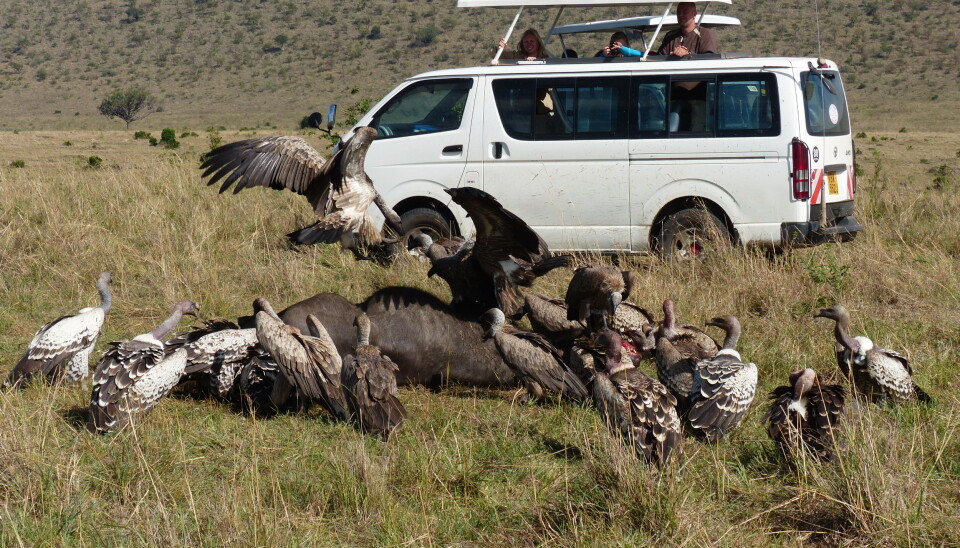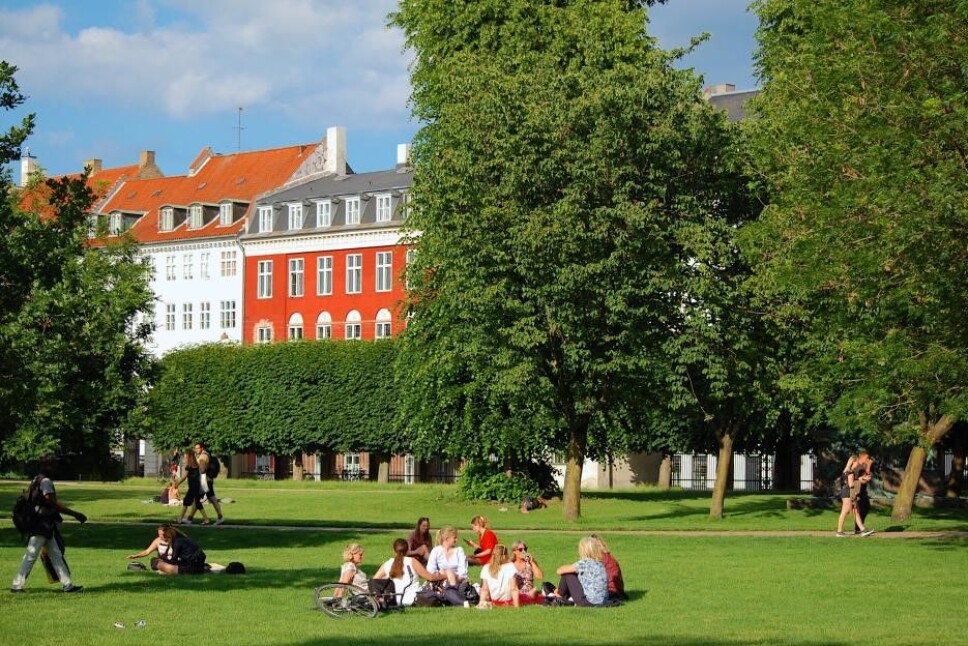Researchers' Zone:

Researchers: Western ideas of Africa are hypocritical fantasies
COMMENT: Africa is corrupt, absurd, dangerous and wild. Or is it? Danish social scientists severely criticise our Western delusions about the continent and its people.
Many hundreds of years have passed since Europeans first docked on the West African coastline and set up the first colonies.
Ever since then, we in the West have produced distorted and one-sided perceptions about Africans and the African continent.
This has been part of a Western dominance rooted in the transatlantic slave trade that took off in the 1600s.
Since then, however, our ideas of Africa have changed considerably – and the West's relationship with its southern neighbour has undeniably taken a less explicitly racist turn.
This does not mean, however, that we have put an end to the West's problematic global position. And in our meeting with Africa – both Africa as an idea as well as a reality – this becomes clear.
In a recent research article, we discussed how simplistic Western notions of Africa sustain and recreate the colonial relationship between the West and Africa.
We base this on four examples of Western alienation of the African continent and its inhabitants.
Idea 1: Corrupt Africa
An enduring notion of Africa is the perception of the continent's extreme level of corruption. This is a problematic notion for at least two key reasons.
First, it should be borne in mind that the common understanding of corruption is, in many ways, defined on the basis of Western practices and norms. It does not take into account cultural differences (and the encounter of these in our ever-more globalised world) in the understanding how wealth should circulate in a society.
Second, corruption can hardly be understood as being isolated to a single continent; rather, it has to be seen as a global phenomenon based on cross-border global networks.
One example is FIFA's numerous global corruption scandals. Another example is Al Jazeera’s recent documentary, ‘The Anatomy of a Bribe’, which depicts how the Icelandic fishing company Samherji paid bribe money to top politicians in Namibia over a number of years to obtain a fishing quota in Namibian waters.
These two examples, and countless others could be mentioned, should be enough to establish how corruption can hardly be seen as an isolated African phenomenon but is rather based on global relations, which are at the heart of our current capitalist reality.
This is not the case, however, and if we look again at the aforementioned documentary, it is striking how the focus seems exclusively directed at the Namibian actors rather than giving similar attention to their Icelandic 'partners in crime'.
Idea 2: Absurd Africa
Another problematic notion about Africa relates to what is seen and portrayed as absurd religious and spiritual practices.
This is a perception that is often used as part of a Western effort to portray its own 'development' and 'civilisation' as being above the rest of the world.
However, this portrayal seems to be both highly problematic and far from any empirical reality.
Let us now take a look at many of the absurdities you can come across during a simple stroll through a given European city – let us say Copenhagen.
Our tour starts in Nørrebroparken. It is summer, and young Danes flock together in their little cliques, where an annual ritual takes place. Their green beer bottles clink, and their more modern cans fly through the air and land on the grass.
Here, the cans wait for the West African migrant, who, due to his 'illegal' status, now has to live as a self-employed bottle and can collector so he can redeem their small cash deposit before seeking shelter from the cold Scandinavian night under a tree in this park or another close by.

After observing how, after having discarded their cans, these young Danes seem almost proud of their misguided charity – 'But I help them with my bottle deposit...' – we now move further down Nørrebrogade, where an elderly lady passes us by.
A smile is exchanged, and the meeting itself is very pleasant. Out of the lady's bag sticks the head of a small dog wearing a woollen shirt and hat – as if it were a handbag-sized human child.
We arrive at Nørreport station, where we find ourselves in front of an advertisement for a multinational coffee company on a bus shelter.
The advert shows a large, smiling African-looking coffee farmer with his arms full of red, freshly picked coffee beans alongside the caption: ‘100 percent organic Fair Trade coffee – support African coffee farmers with every cup of coffee you buy.’
With this little stroll in mind, we must now wonder why Africa and its people are discussed and imagined as being more absurd than their Western neighbours.
Can it be a way for people who insist on such ideas to avoid a confrontation with their own absurdities?
Absurdities which, through profound colonial and imperialist propaganda, became both denied and demonised. Of course, the absurd did not belong to 'us' but to 'the (African) other'.
Idea 3: Dangerous Africa
Another absurdity is our aid for the 'poor', 'sick' and 'dangerous' Africans.
In recent years, we have seen a massive media-driven effort against the infectious disease of Ebola in Africa. We in the West have had a huge focus on – and sent support to – the fight against Ebola.
The disease is discussed as if it is something that will kill millions of people in Africa. Our help in fighting Ebola thus fits perfectly with the image of Africa as a disease-stricken continent with an inability to manage disease control and its own development.
Our effort is described as an altruistic one for Africa, but if we delve deeper, our effort must be seen primarily in the light of our fear that the disease could spread to our latitudes and hit us.
For example, if you zoom in on the Congolese, who are currently exposed to Ebola, many of them do not see Ebola as their biggest problem, because many more are sick and dying from malaria and conflicts that local communities do not feel we are addressing – perhaps because of perspectives such as: 'but it is Congo ... there are always conflicts and problems down there'.
What this platitude does not take into account is that the numerous conflicts are due to international, and mainly Western, interests in exploiting Congolese natural resources.
Our mainstream view of the relationship between the West and Africa is still one of us being the self-proclaimed 'civilised' people and Africans as the 'sick', 'weak' and 'uncivilised'.
This very distorted self-image was eerily described by the Polish-born author Joseph Conrad in his book Heart of Darkness, published, after a couple of decades’ work, in 1902. Conrad describes how 'civilised' Westerners behaved far more uncivilised than the Africans they met.
Although much has changed since 1902, the question remains as to whether the primary purpose of our civilising project in Africa is to hold on to Africans as those who we help with our charity while we enrich ourselves on their wealth.
Idea 4: Wild Africa
For many, 'wild Africa' is becoming increasingly attractive as a tourist destination.
Safari tourism to eastern and southern Africa, in particular, is appealing to the stalwart, western, seasonal explorer who, for the next three weeks, swaps the shirt and tie for a khaki outdoor outfit – safari-style – armed with the latest Canon SLR camera.
The prospect of experiencing 'the big five' (the lion, leopard, elephant, black rhino and buffalo, ed.), such dangerous animals, is exhilarating; being able to encounter these at the closest possible range in their 'natural habitat'!
Our experience with these wild animals has to be without humans, especially Africans, but locals are welcome to entertain us with their wild and exotic tribal dancing for the evening coffee.
At the same time, we sit quietly and imagine how the locals live with the wildlife we saw earlier and which they are not allowed to hunt or harm.
Wild animals are appreciated by us tourists, but the animals kill and damage the lives of thousands of Africans. Meanwhile, back home in tranquillity, there is no place for dangerous wolves, and disease-infested wild boars must be fenced in.
Africa's biodiversity is rich and unique with a growing number of endangered species, even though the West, and western NGOs in particular, have been the driving force for nature conservation in Africa, which means, for example, that around 40 percent of Tanzania's land area has been 'set aside' for wild animals.
We will continue to criticise colonial fantasies
Although we are seeing change and improvement in our understanding of Africa and its inhabitants, mainstream perceptions of the continent are still marked by erroneous generalisations and dehumanising discourses.
These hamper the understanding of both the possibilities and challenges held by the continent.
We believe that we in the West have a special obligation to put an end to our idealised self-understanding and our misplaced fantasies about Africa – because it is only by doing so that we can begin to change our own dysfunctional patterns of behaviour.
This article is based on the authors’ article in Review of African Political Economy in 2019.
References
Rune Larsen’s profile (KU Leuven)
'Heart of Darkness'. Joseph Conrad (1899).






